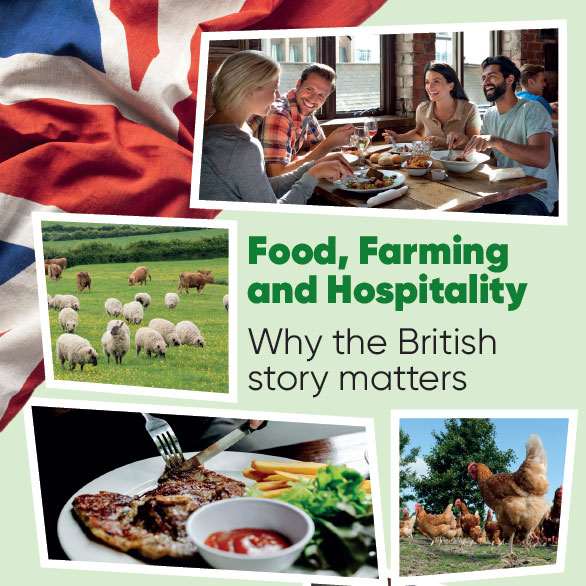From 16 September to 1 October, home-produced food will bask in the promotional glow of BFF (British Food Fortnight).
For many years supermarkets have sought the publicity boost of being the first to stock the first products of various fruit and vegetables’ seasons, to gain an edge by selling unique or exclusive varieties, or simply claiming to be the best supporter of British produce.
But away from the scrutiny that retailers receive, the public procurement sector has long been criticised for failing to support domestic farmers.
The NFU, which has done a great deal of work to encourage the public sector to buy more domestic produce, believes collaborative relationships between hospitality businesses and local producers will further embed British food as an integral part of out-of-home eating.
To that end, President Minette Batters hosted a roundtable in May at which she told industry leaders and foodservice operators how British farming, food and hospitality are intrinsically linked and that British food helps to boost standards, sustainability and offers a valuable farm-to-fork story.
“Developing relationships between the out-of-home sector and British farmers and growers will create even more opportunities to serve up local food that is safe and fully traceable, providing the provenance the public increasingly appreciates, as well as helping to strengthen our domestic food security,” Minette said.
“The NFU will continue these conversations by holding further roundtable discussions in order to engage with all aspects of the UK’s diverse hospitality sector.”
“Developing relationships between the out-of-home sector and British farmers and growers will create even more opportunities to serve up local food that is safe and fully traceable.”
NFU President Minette Batters
British Food Fortnight is an opportunity to showcase the best of the industry and it sees home-grown food proudly flagged up on menus across the country, but the goal is to make that the norm rather than the exception.
So as the annual celebration of British food rolls around, has there been progress in sourcing more home-grown produce in the nation’s schools, hospitals, prisons and government buildings, and how can farmers go about accessing this vast sector?
 The current picture
The current picture
According to Alexia Robinson, founder of the LBF (Love British Food)) movement, despite “great efforts” having been made by public sector catering teams up and down the country in recent years, “levels of British produce are not where we would like to see them”.
As part of efforts to correct that, LBF has been asked by NHS leadership to deliver a farm visit for every NHS trust in the country, in the hope of boosting domestic sourcing in the nation’s hospitals.
“It’s all too easy to just talk about serving more British produce, but actually delivering change is far more challenging,” Ms Robinson admits.
She believes that the main barrier for farmers is the procurement contracts themselves, which she describes as “laborious and incredibly complicated”, and she wants to see the whole process simplified and opened up to thousands of British SMEs who have the potential to enter the market. And it now seems like that call may actually have been heard.
 Changing times?
Changing times?
On 1 August, the Crown Commercial Service, which helps the UK public sector procure goods, announced new plans to help schools, hospitals and other institutions buy higher-quality food and drink at better value for the taxpayer.
The move will see the creation of a single online portal to make it easier for public sector customers and small businesses by offering a simplified route to market, with the aim of opening up access to a range of food and drink suppliers for the public sector.
Only 30-40% of the produce bought through the school fruit and veg scheme is UK-sourced and seasonal.
2019/20 figures
Crucially, the government said the initiative would create more choice for customers, while also improving standards and providing better access to locally-sourced produce.
The longer-term ambition is to further embed government buying standards to food and catering served through all public sector organisations, delivered via the new centralised portal. The government buying standards for food will be updated by Defra in due course.
Parliamentary secretary for the Cabinet Office Alex Burghart said the new system would “deliver better-quality food to our schoolchildren and care home residents, while creating a level playing field to help small businesses win more contracts from the public sector”.
The Crown Commercial Service has engaged with food suppliers and industry bodies from across the UK to develop its procurement strategy for the new agreement, which is expected to be open for business in spring 2024. The initial contract value is estimated to attract £100 million worth of spend over the four-year contract period.
Shortages brought food security into focus
There is certainly a sense that public procurement – the last great frontier where British sourcing has lagged behind – is finally catching up.
According to Sysco, the parent company of catering giant Brakes and leading fruit and veg supplier Fresh Direct, there has been a genuine increase in interest for British food, which has been driven by a number of factors, including a desire for provenance and a wish to support British farming and to use more seasonal products.
There is also the benefit of freshness and quality as it is grown closer to home, Stuart Smith, merchandising director at Sysco GB, said.
“Shortages of products across the supply chain have brought the importance of food security into focus,” he explained.
“We’ve also seen the challenges of Covid and the uncertainties of Brexit, which have shown the importance of robust routes to market for suppliers and the benefits of local supply chains.
“We believe it’s fundamental to the future of British agriculture and, as such, we are supporting an increase in British produce.”
Expanding on this last point, Mr Smith notes that Fresh Direct has been running a ‘Best of British’ campaign to provide chefs and buyers with information on British producers and products and raise awareness of practical, seasonal solutions.
Brakes, meanwhile, is backing LBF and BFF and playing a prominent role in industry organisations such as local authority catering group LACA and the Public Sector Catering Alliance.
Brakes and Fresh Direct are actively talking with customers to increase the proportion of British products on their menus, he added.
There are myriad reasons why it would benefit the country’s health and environment to have more British produce on plates, as endorsed in the government food strategy, but there’s still more to do.
Ruth Westcott, climate and nature emergency co-ordinator at Sustain, the alliance for better food and farming, is calling for minimum targets for buying British produce, which increase over time, for example.
The first step would be to ensure that all fruit and veg bought through the school fruit and veg scheme is UK-sourced and seasonal, Ms Westcott points out, citing 2019/20 figures that show only 30-40% of the produce was British, including just 13% of apples.
As the NFU event showed, a true partnership of buyers and suppliers is the way to getting more British fresh produce into the public arena. The message is clear that the two sides need each other. Recent events suggest that while there is undeniably further to go, that message may finally be hitting home.





